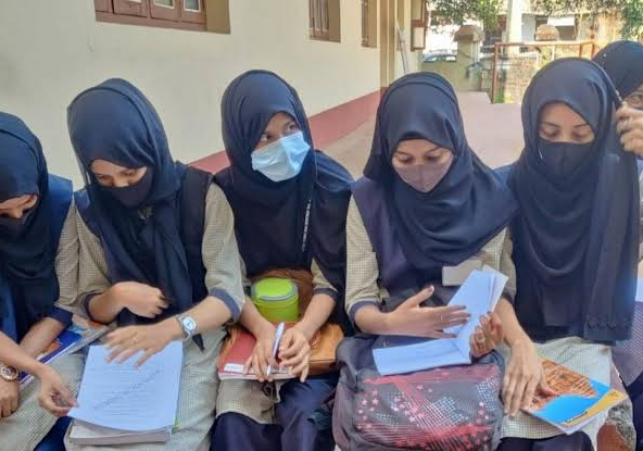

The almost three-week standoff between a government faculty in Karnataka's Udupi county and a small group of Muslim college students who must wear a hijab during classes escalated Thursday morning when they protested with placards outside the faculty gates.
The students stated that preventing them from wearing a hijab – something their seniors were permitted to do – is a violation of their fundamental rights, and that they feel uncomfortable sitting in front of male lecturers without one.
The recent protests come a day after academic officials and district officers issued the students an ultimatum: follow the gown rule and get an education, or wear one and go home.
The demonstrations come after the state's Education Minister, BC Nagesh, told NDTV that the practise was "indiscipline" and that colleges and universities were "not a place to practise dharma."
Mr Nagesh further accused "a few persons" of politicising the issue in the run-up to the 2023 Assembly election, and sought to know why the scholars "want to exercise constitutional rights now."
"Did this law come into effect after the BJP took office in Karnataka?" Since 1985, when the BJP was not in office, this rule has been in place. The SDMC (school development and monitoring committee) made a wise decision in introducing a dress code (for females, churidhar and dupatta) to ensure uniformity... "They've been wearing it for about 15-20 days," he told sources
Over 100 Muslim college students were registered at that particular faculty, according to the minister, "but only these students don't want to observe (the clothing requirement)...." "School is not a place where dharma can be practised."
Mr Nagesh pointed to the Congress when asked if the Education Department should infringe on women's right to practise their faith and if wearing a hijab, or scarf, broke any rules.
"When the Congress was in power, they followed the rules. But now they've got a problem, don't they? Now they want to exercise their fundamental rights? He stated, "Indiscipline cannot be a right."
The protesting students told Sources that their parents had frequently asked faculty officials to allow them to wear the hijab, but to no effect.
"We are unable to sit comfortably... That is why we cover our heads with a hijab. This is a government institution... We are a female college, but we have male lecturers. We don't mind sitting without a hijab if the instructors are female, however we have male lecturers. "We're not at ease," Safa, a second-year student, said.
Aliya, another student, told sources that her seniors were permitted to wear the hijab during class, but that
they were "mentally tortured" for doing so.
In the college, there is religious discrimination. Even though it is a government college, we are unable to say'salaam' or speak in Urdu. Other students are permitted to converse in Tulu (a native dialect)... Lecturers communicate with us in Tulu. "However, we are not permitted to speak in Urdu," she explained.
"Why are they acting like we're doing a crime?" Aliya asked, pointing out that the school's terms and circumstances make no mention of wearing a hijab. "All we're asking for is a headscarf," she explained.